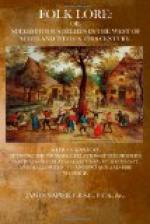In my young days, a process of divining, allied to casting lots, was resorted to by young women in order to discover a thief, or to ascertain whether a young man who was courting one of them was in earnest, and would in the future become that girl’s husband. The process was called the Bible and key trial, and the formula was as follows:—A key and Bible were procured, the key being so much longer than the Bible that, when placed between the leaves, the head and handle would project. If the enquiry was about the good faith of a sweetheart, the key was placed in Ruth i. 16, on the words, “Entreat me not to leave thee: where thou goest I will go,” etc. The Bible was then closed, and tied round with tape. Two neutral persons, sitting opposite each other, held out the forefingers of their right hands, and the person who was consulting the oracle suspended the Bible between their two hands, resting the projecting parts of the key on the outstretched forefingers. No one spoke except the enquirer, and she, as she placed the key and Bible in position, repeated slowly the whole passage, “Entreat me not to leave thee,” John or James, or whatever the name of the youth was, “for where thou goest I will go,” etc. If the key and Bible turned and fell off the fingers, the answer was favourable; and generally by the time the whole passage was repeated this was the result, provided the parties holding up the key and Bible were firm and steady. For the detection of a thief, the formula was the same, with only this difference, that the key was put into the Bible at the fiftieth Psalm, and the enquirer named the suspected thief, and then repeated the eighteenth verse of that Psalm, “When thou sawest a thief then thou consentest with him,” etc. If the Bible turned round and fell, it was held to be proof that the person named was the thief. This method of divining was not frequently practised, not through want of faith in its efficacy, but through superstitious terror, for the movement of the key was regarded as evidence that some unseen dread power was present, and so overpowering occasionally was the impression produced that the young woman who was chief actor in the scene fainted. The parties holding the key and Bible were generally old women, whose faith in the ordeal was perfect, and who, removed by their age from the intenser sympathies of youth, could therefore hold their hands with steadier nerve. It is only when firm hands hold it that the turning takes place, for this phenomenon depends upon the regular and steady pulsations in the fingers, and when held steadily the ordeal never fails.




